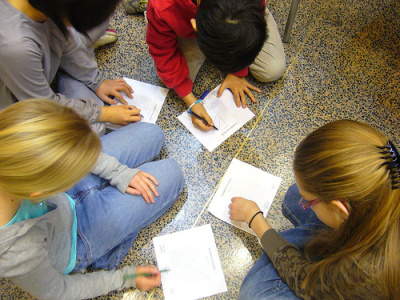Informal Education and Working with Home School Groups
A Guide To Help Other Information Education Venues work with Home School Students

After conducting informal science education programs (outside of the classroom) for over thirteen years I have found that the number of home school groups attending my programs has increased exponentially. With an increase in this audience I've found myself in conversation with other educators trying to forge a way to best meet the needs of the varied ages, rates of learning, and abilities that present themselves with home schoolers. In this post I'll attempt to share a bit of what I've learned that in turn might help others.
Most Home School Families Really Need and Seek Out Lab Sciences
It's difficult for parents that are home schooling to offer comprehensive science lab experiences at home without building a lab in their own house. I've seen some parents do this, but it's costly and rare. Because of this many home school parents seek out informal education centers where their students can have hands-on science lessons an labs, with everything from chemistry to dissections. This is a growing home school need and a great opportunity for science centers.
Home Schoolers are Home Schooled for A Variety of Reasons
I've found that parents choose to home school for many reasons, which include student's developmental needs, religious reasons, quality of schools in the area, to offer more extracurricular opportunities, traveling, and health. The reasons are as varied as the students and why you, as an educator, need to get to know your parents and students.
Are Home Schoolers Really Socially Awkward?
For home school parents that read this blog, please forgive me but I must answer this question because it's one of the first ones asked by other educators and those considering working with home schoolers. My answer would be that home schoolers are very similar to school populations in that they are mixed. Some children are very social, outgoing, and are natural with other people. On the reverse side some that have problems working in groups or with other students. Largely I've found that most home schoolers fall in the middle. They're kids and they're learning, and growing and if you can keep them engaged, more than willing to try new things and work with others.
Learning Disabilities and Home Schoolers
Yes, some home school parents are home schooling because their students have learning disabilities. As an informal educator you have to be prepared for the open enrollment nature of programs and the likelihood that you will have these students in class. I have found that home school parents were often unaware that they needed to make me, as the instructor, aware of any learning difficulties or disabilities that their students may have when registering for a class. Many times I've gone into a class to find that one or more of the students has autism or can't read or write at level for various reasons. Prepare for this and make sure that you let parents know that that they should talk to you before registering.

Working with Home Schoolers Requires Splitting Up the Age Groups
When you create home school programs for an informal education setting it's important to consider the age ranges that will be registering and how to break them out. The most popular audience age ranges for my science programs are 5-12 yrs. though there are requests for some 13-16 yr. olds. To accommodate this range I've broken programs down into 5-7 yr. olds, 8-12 yr. olds, and 13-16 yr. olds. I am very strict about the starting age, because I require some writing in my programs and students must be potty trained and able to sit for at least 30 minutes. When parents suggest that their 6 year old is working at a 12 yr. old level I ask that they first have the child meet with me so that I can evaluate if the child is really OK to move into an older class. Most of the time I find that it's better for the student to be a "big fish in a little pond" with students their own age or younger, rather than a "little fish in a big pond" of older students. On average I keep the 5-7 yr. old programs to 1 hour, the 8-12 yr. old programs to 1.5 hours, and the 13-16 yr. old programs to 2-3 hours depending on the topic.
Siblings in the Classroom
Unlike other groups you should prepare to have the question arise about siblings in class. Because many parents are home schooling several children at the same time (we had one parent with 6 kids at once!) you should realize that you will either need to allow siblings to sit in the back of the classroom, with their parents, or in a space that you provide for them somewhere else. The issue of siblings also means that you may have parents coming in and out of the classroom several times to check on their student that is in class and outside of class. A good solution is to provide a homework/play area outside the classroom where younger and older siblings can hang-out and wait. Because parents may want to have children that are siblings attend your classes (and they are in different age groups) then it also makes sense to have your younger and older classes back to back. This way parents don't have to drive all the way to your site for two separate classes (which often they won't).
Parents Are a Good Addition to the Classroom (Up To A Point)
Working with home school students is a bit different than the standard field trip because, not only do the students come with siblings but their parents often want to attend the programs as well. You'll have to decide if this is something you will allow with your classes. I find that parents are quite useful for a variety of reasons, behavior control, helping students that are struggling, lending a hand passing things out, etc. However, the upshot to this is that some parents can be over-bearing to their own kids and even other children. If you do allow parents in you may need to state some rules about sitting with students, or in the back of the room, and what their roles should be if they are allowed in. I allow parents in the classes for the age groups up to 12 yr. but not for the 13016 yr. old kids. By this time the kids don't want the parents there anyway, and they're pretty independent. I do make exceptions for certain classes, like final presentations or if there are behavioral problems.
Home School Students May Need To Be Oriented To Some Basic Skills
One thing I learned in home school classes was that home schoolers aren't familiar with some of things that many school children learn in school, so you'll have to be prepared for this. In one case a class of students didn't know what to do in the case of a fire alarm going off. They were unsure if they should run or line up. You may need to do some background work if these types of issues may arise in your setting. I've found some basics about classroom (indoor/outdoor) etiquette are useful. Such things may include asking to go to the restroom, raising hands, and especially writing names on papers or work.
I feel like I would be remiss if I didn't mention writing and math skills in this section. I've found that in the different age groups that there is a spectrum of abilities for writing and math. In a class of 5-7 year old there's a big gap between how well a 7 year old writes and a young 5 year old (entering Kindergarten). I especially have had difficulty with some 9 year olds not being able to write at grade level. Some could barely write their names! The same is true for math. There is a wide spectrum of abilities. I found that some children in the 8-12 year old groups were very math-literate and they could do fractions, ratios, and math in their head. However some students in this same age group could barely add and they didn't know what division was. If you do activities involving math or writing be prepared for this spectrum, and maybe have some extra volunteers on hand to help those students that are moving a bit more slowly. Oh, and don't expect that kids in the 8-12 range know what the symbols on a calculator are, or even how to use a calculator!
Notebooks, Handouts, and Pre-Class Materials
I've found that home school parents need materials and hand-outs as supplemental proof of the classes that they are using for their curriculum (expect picture taking too). It's a good idea to use hand-outs that students can take home or to make the worksheets available online. I use a blog to communicate with the home school students, and on that blog I post pre and post class materials for the students. This allows parents to prepare students for the classes before they come to class. I found mixed results with how many parents actually do the pre-class work but overall it's worth the effort and the parents appreciate the supplementary materials.
Home School Networks are Extensive so Use Them To Recruit
One really nice thing about home school students is that they have extensive networks online and socially. Get to know your parents and the social media that is out there, because these are great ways to spread the messages about your classes. Almost every state and county has a home school network page. There are Yelp groups, bulletin boards, websites, Facebook pages, Yahoo Groups, and blogs.

